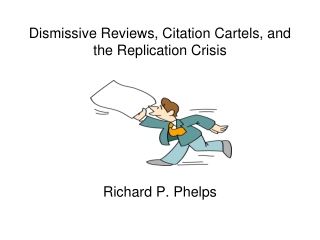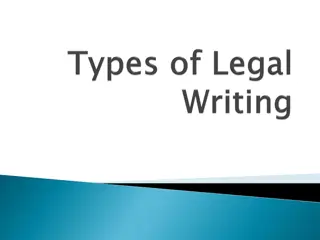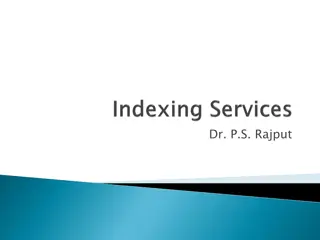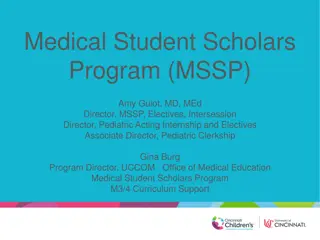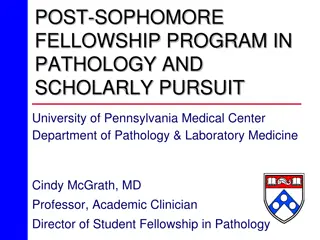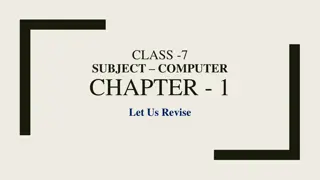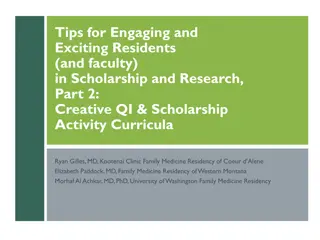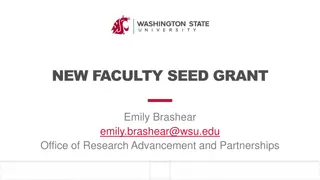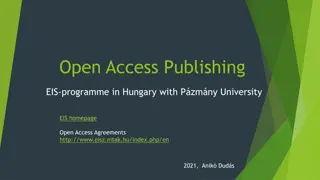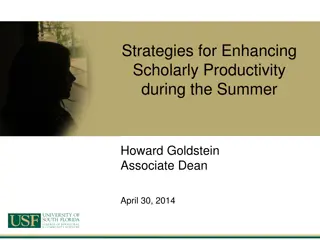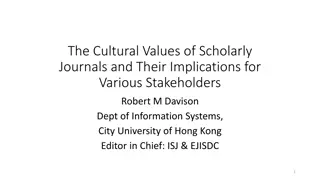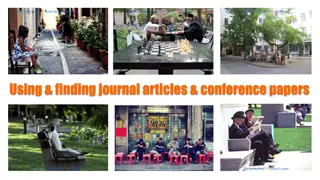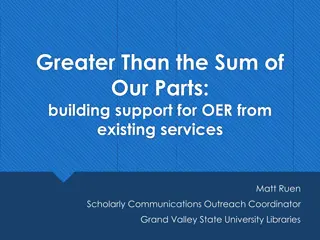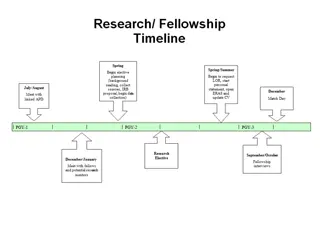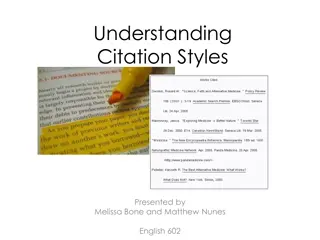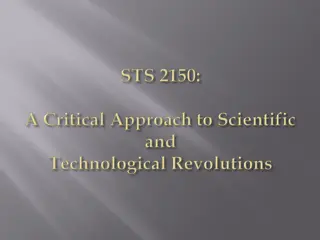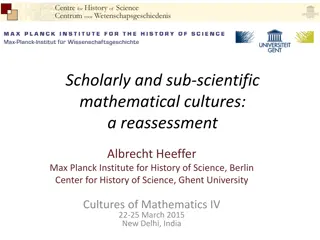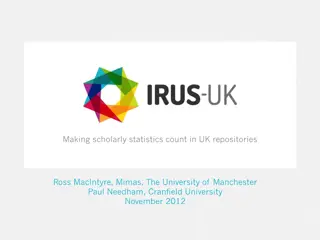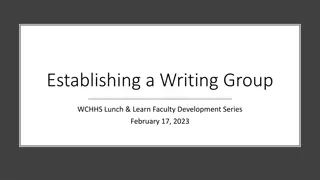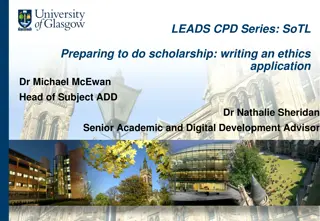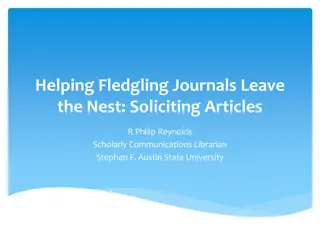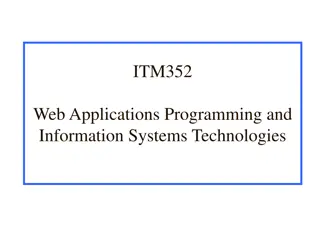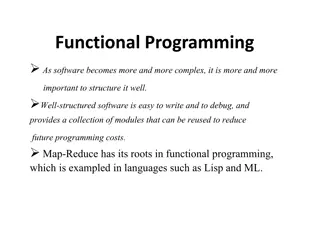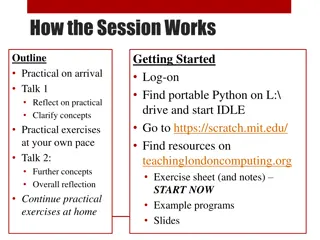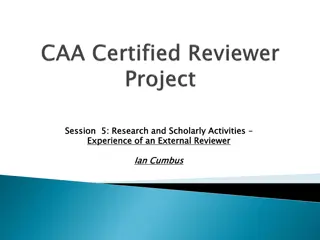Dismissive Reviews, Citation Cartels, and the Replication Crisis
The study delves into the replication crisis in research, citing factors influencing research credibility such as sample size, effect size, and financial interests. It highlights issues like gaming the system, P-hacking, and data sharing reluctance. The growth of Metascience as a response to these c
0 views • 45 slides
The Purpose and Methodology of Scholarly Legal Writing
Scholarly legal writing serves to advance knowledge within specific fields by offering in-depth analysis, historical context, and contributing new insights to legal literature. It distinguishes itself from practice-related writing by focusing on research, surveying existing knowledge, and engaging i
3 views • 22 slides
Decision Analysis and Operations Research in Management
This content delves into Management Decision Analysis and Operations Research techniques such as Linear Programming, Integer Linear Programming, Dynamic Programming, Nonlinear Programming, and Network Programming. It covers the phases of an Operations Research study, mathematical modeling for decisi
0 views • 36 slides
Indian Citation Index (ICI) - Enhancing Access to Indian Scholarly Content
Indian Citation Index (ICI) is a multidisciplinary research platform developed by The Knowledge Foundation. With over 1000 scholarly journals, ICI aims to bridge the gap between content sources and users, providing online access to a wide range of Indian publications in various fields. The database
0 views • 10 slides
Medical Student Scholars Program Overview
The Medical Student Scholars Program (MSSP) offers motivated medical students opportunities for in-depth exploration of various specialties, including clinical experiences, research projects, scholarly work, and leadership development over four years. The program features tracks in cardiovascular me
0 views • 21 slides
Post-Sophomore Fellowship Program in Pathology and Scholarly Pursuit at University of Pennsylvania Medical Center
Student Fellowship Program in Pathology at University of Pennsylvania Medical Center offers a unique work-study experience for students interested in pursuing a career in pathology. The year-long program includes rotations in Anatomic and/or Clinical Pathology, a dedicated research project, and tail
2 views • 4 slides
Module 2: PSEA and Safe Programming Training of Trainers (ToT) by CRS HRD
This Module 2 focuses on PSEA and Safe Programming, covering key sessions on understanding safe programming, identifying protection and SEA risks, and mitigating risks. It emphasizes the importance of safe programming in increasing safety, dignity, and access, with staff playing a crucial role. Part
2 views • 19 slides
Understanding Computer Programming: Basics and Beyond
In this chapter, we delve into the fundamental concepts of computer programming. We explore the definition of a program, the role of programming languages, types of programming languages, and generations of programming languages. Additionally, an assignment is provided to reinforce the key learnings
0 views • 25 slides
Scholarly Project Module in MBBS Year 3 Overview
Scholarly Project Module (SPM) in MBBS Year 3 is a pivotal module focusing on developing students into doctors as scholars and scientists. It includes a project-based approach, essential skills development, and assessments like a 3000-word essay. The module runs in the first semester and covers vari
0 views • 11 slides
Insights from Surveys on Peer Review & Peer Feedback in Scholarly Communication
Results from surveys on peer review and peer feedback provide valuable insights into the demographics, general attitudes, and major challenges faced in scholarly communication. The data reveals respondent demographics, overall satisfaction with peer review systems, and prevalent problems in current
0 views • 13 slides
Understanding Object-Oriented Programming (OOP) in Python
Python is a versatile programming language that supports various programming approaches. Object-Oriented Programming (OOP) is a popular method in Python where objects are created to solve programming problems. OOP in Python focuses on creating reusable code, following the principle of DRY (Don't Rep
0 views • 35 slides
Enhancing Engagement in Scholarly Activities and Research in Family Medicine Residency Programs
Explore strategies and challenges in promoting scholarly activities and research participation among residents and faculty in family medicine residency programs. Learn about ACGME/RRC requirements, importance of research in primary care, and creative QI and scholarship curricula. Discover insights o
0 views • 25 slides
Washington State University New Faculty Seed Grant Program
Encouraging new junior-level faculty at Washington State University to develop research, scholarly, or creative programs with the potential for sustained professional growth and external support. Eligible applicants include junior-level faculty appointed on or after May 16, 2019. The program offers
0 views • 26 slides
Introduction to Computers and C++ Programming Lecture 1 - Overview and Basics
This lecture covers the fundamental concepts in computer systems and programming using C++. Topics include the main components of a computer, bytes and addresses in memory, computer systems hardware and software, understanding programs, programming languages, compilers, preparing and running C++ pro
1 views • 21 slides
Open Access Publishing and EIS Programme at Pázmány University: Empowering Research and Scholarly Communication
Discover the advantages of Open Access (OA) publishing and how researchers benefit from immediate accessibility, increased discoverability, and global readership. Learn about the EIS Programme at Pázmány University, a member institution dedicated to providing essential electronic resources for hig
0 views • 12 slides
Strategies for Enhancing Scholarly Productivity
Enhance your scholarly productivity with effective strategies like creating a routine time for writing, setting realistic goals, organizing your writing space, and getting started with daily writing habits. Maximize your time wisely and prioritize writing tasks to achieve your summer goals.
5 views • 27 slides
Web Application Development and Programming CTE Program Overview
Viera High School offers a comprehensive CTE program in Web Application Development and Programming, taught by Mr. Dohmen. Students learn popular programming languages like Python, SQL, JavaScript, Java, C#, and C. The courses cover web programming, JavaScripting, and PHP programming, providing cert
1 views • 7 slides
Scholarly Journal Cultural Values and Stakeholder Implications
Scholarly journals like ISJ and EJISDC embody cultural values that shape behaviors and interactions among stakeholders. This keynote delves into the significance of diversity in editorial boards, care for stakeholders, trust, integrity, community, and the types of research published. An emphasis is
0 views • 23 slides
Introduction to Programming with RobotC in Robotics Education
Programming in robotics involves giving specific directions to a robot using software like RobotC. This introduction covers the basics of programming, software organization, and how to get started with RobotC through creating flow charts and programming tasks. Learn about setting up RobotC, creating
0 views • 8 slides
Introduction to Programming and Computer Instructions
Programming is the process of creating instructions for computers to follow and accomplish tasks. It involves turning human language instructions into detailed binary machine language. Before learning programming, individuals may have different levels of experience, ranging from no experience to pro
0 views • 16 slides
Understanding Different Types of Literature: Journals and Conference Papers
Explore the distinctions between trade and scholarly journals, the value of scholarly articles for higher-order thinking, and the insights provided by conference papers for practicing planners. Learn how to search for journal articles and conference papers effectively in preparation for research in
1 views • 7 slides
Building Support for OER at GVSU: A Collaborative Initiative
Embodying values, seizing opportunities, and encouraging innovation, Grand Valley State University's Libraries, Scholarly Communications, and other support services join forces in the OER Initiative. Motivated by enhancing research, teaching, and technology support, the initiative receives backing f
1 views • 25 slides
Residency Scholarly Endeavors and Requirements at OHSU
Residency at OHSU entails engaging in two scholarly endeavors throughout the program, including first-author responsibilities for various academic presentations and publications. The structured timeline outlines activities from July to July, such as training, mentor meetings, manuscript submissions,
0 views • 12 slides
Importance of Understanding Citation Styles in Academic Writing
Understanding different citation styles is crucial for academic writing across various disciplines. It helps students comprehend the role of citation in different communities, research methodology, and the value of knowledge in diverse fields. Citation practices in the humanities emphasize authority
0 views • 12 slides
Understanding Handlin's Key Concepts and Arguments in Scholarly Articles
This exploration delves into the principal conclusions, key concepts, and arguments presented by Handlin in scholarly articles. It scrutinizes how Handlin interprets the key concepts, distinguishing his perspective from others. The analysis aims to provide a comprehensive understanding of Handlin's
0 views • 32 slides
Reassessing Scholarly and Sub-Scientific Mathematical Cultures
Scholarly and sub-scientific mathematical cultures are reevaluated through the works of Jens Hoyrup, focusing on the organized nature of sub-scientific knowledge. The distinction between theoretical and practical knowledge, applications to mathematical cultures, and misconceptions related to the sup
0 views • 53 slides
Development of Attosecond Theory for Nobel Prize through Verilog Programming
Attosecond generation is a crucial technique for creating attosecond pulses by manipulating radiation waves. This research paper focuses on developing the Attosecond generation equation through Verilog programming and validating it using test programming techniques. The interface between equations,
0 views • 15 slides
Enhancing Scholarly Statistics in UK Repositories
The IRUS-UK project aims to standardize and improve the collection and reporting of usage statistics for UK institutional repositories. By enabling sharing of reliable and comparable statistics, IRUS-UK facilitates benchmarking and demonstrates the value of repositories in scholarly dissemination.
0 views • 18 slides
Establishing a Writing Group for Faculty Development in WCHHS Lunch & Learn Series
Engage in a dynamic writing group to foster collaboration, receive feedback, and enhance productivity. Explore the benefits of accountability, safe feedback, and breaking down frustrations while celebrating accomplishments. Dive into logistics, including duration variability, writing retreat options
0 views • 9 slides
Ethics Application: Scholarly Preparation & Considerations in Educational Research
Explore the importance of scholarly preparation for writing an ethics application in educational research, incorporating adequate preparation, ethical considerations in SoTL, BERA guidelines, and ethical considerations such as risk, consent, and confidentiality.
0 views • 14 slides
Strategies for Soliciting Articles in Scholarly Publishing
Scholarly publishing entails soliciting articles effectively to nurture fledgling journals. This involves utilizing diverse methods such as sending questionnaires, posting flyers, and leveraging traditional publisher services. Editors play a vital role in initiating the process early and engaging mu
0 views • 16 slides
CS252 Systems Programming Course Overview
This course overview covers topics such as C programming review, Unix basics, Unix systems programming, and grading details. The course includes labs on C/C++ programming, Unix shell scripting, and writing your own shell. Communication is emphasized through Piazza for questions/answers and Blackboar
0 views • 41 slides
Introduction to Programming Languages and Functional Programming with OCaml
Welcome to Lecture 1 of CSEP505 on Programming Languages focusing on OCaml and functional programming. Professor Dan Grossman introduces the course, discusses the importance of studying programming languages, and shares insights on course mechanics and content. Topics include staff introductions, co
0 views • 84 slides
Understanding ITM352 and Its Role in MIS
Welcome to ITM352, a course focusing on acquiring basic programming skills in a business context. This course emphasizes hands-on experience in developing relevant software applications, addressing real technology problems, and fostering rapid self-learning of IS/IT technologies. Misconceptions arou
0 views • 36 slides
Understanding Functional Programming Paradigm
Functional programming emphasizes well-structured software that is easy to write and debug, with reusable modules to reduce future programming costs. It introduces higher-order functions and first-class function values, fostering declarative programming for tasks like symbolic data manipulation and
0 views • 21 slides
Essential Principles of Teaching Programming Languages
Foundational concepts in programming form the core of computing. This encompasses understanding programming fundamentals, teaching language aspects effectively, statistical programming for data analysis, and guiding students unfamiliar with programming environments towards grasping the logic and sim
0 views • 23 slides
Exploring Computer Programming Principles
Dive into the world of computer programming, covering high-level and machine languages, compilers, interpreters, writing programs, top-down design, and the array of programming languages available. Understand the essentials of building code to control computers, the diversity of programming language
0 views • 23 slides
Transitioning from Scratch to Python: A Practical Approach for Learning Textual Programming
Explore the transition from visual programming in Scratch to textual programming in Python using Turtle Graphics. Engage in practical exercises, clarify key concepts, and reflect on the challenges and progress in learning core programming concepts. Utilize resources from TeachingLondon Computing to
0 views • 21 slides
CS 288-102 Intensive Programming in Linux Spring 2017 Course Details
Learn Linux programming, C language proficiency, Bash scripting, and more in this intensive course taught by Instructor C.F. Yurkoski. The course covers programming in Linux environment, command line interface, C language, client/server programming, and essential programming concepts like pointers,
0 views • 31 slides
Research and Scholarly Activities External Reviewer Experience
Explore the experience of an external reviewer in evaluating research and scholarly activities within an educational institution. Key aspects include assessing research strategy, scholarly productivity, and student engagement in research. Examination of policies, strategy development, resource alloc
0 views • 10 slides
